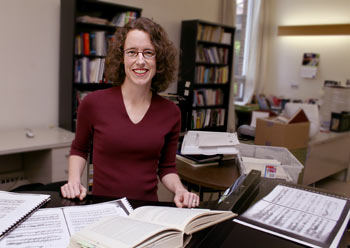

Venture Boldly

Office of Communications
2 East South Street
Galesburg, IL 61401

 Sarah Day-O'Connell, assistant professor of music at Knox College, has been awarded a prestigious Edison Fellowship to conduct research this fall at the Sound Archive of the British Library in London. From September through November, Day-O'Connell will study recordings of songs, known as "canzonettas," that Joseph Haydn wrote in London in the 1790s.
Sarah Day-O'Connell, assistant professor of music at Knox College, has been awarded a prestigious Edison Fellowship to conduct research this fall at the Sound Archive of the British Library in London. From September through November, Day-O'Connell will study recordings of songs, known as "canzonettas," that Joseph Haydn wrote in London in the 1790s.
The highly competitive Edison Program selects just one fellowship recipient annually. The fellowship is for ?5,000, or more than US $10,000. It supports research by scholars from around the world into the history of recorded music, utilizing the British Library's Sound Archive, one of the largest repositories of music recordings.
"Haydn's canzonettas are absolutely captivating musically, but this genre of song has been all but lost to history," Day-O'Connell said.
Canzonettas -- vocal works with piano accompaniment -- were written to be performed in the home, Day-O'Connell said. "This was long before television. After dinner, people would do things like read to each other from novels and sing songs such as these canzonettas."
In the same way that recorded music is marketed today, newspapers of the 1790s carried advertisements along the lines of: "Dr. Haydn has just published six canzonettas, and you can go to the publisher's house to purchase them," Day-O'Connell said.
Unlike classical performances today, the singers of canzonettas would have accompanied themselves on the piano, Day-O'Connell said. "These were high-level musical accomplishments. Many of these songs are not easy to play and sing."
But despite the skill required to perform them, canzonettas have not been taken seriously by critics and scholars, in part because they were classified as "women's work," Day-O'Connell said, "Also, our view of 18th-century music was created by 19th-century writers who thought in terms of 'masterpieces,' which meant big works because they seem more 'monumental.' Likewise, for many critics, words interfered with a masterpiece's 'timelessness,' so they favored instrumental over vocal works."
Day-O'Connell said that examining the recordings will allow her to study the canzonettas' meaning as performances. "Are the singers reading the text and interpreting the score the way an 18th-century performer might have? Does the song mean something different in the early or late 20th century than it did then? A canzonetta sung by Marian Anderson may be a different thing when sung by Peter Pears," Day-O'Connell said, describing just two of the artists whose rare early 20th-century recordings she will be studying in the British Library.
According to the Library, its classical section alone contains tens of thousands of recordings, including commercial, private, unpublished and test recordings, as well as more than 30 years of television and radio broadcast recordings from the BBC and Voice of America.
Day-O'Connell is working on a book about Haydn's canzonettas that will bring together her work on the recordings with research on the canzonettas' contemporary contexts, especially the way the songs reflect late 18th-century concerns about the expansion of science and industry.
"Many of the texts for Haydn's canzonettas were written by Anne Hunter, wife of the famous British surgeon John Hunter," Day-O'Connell said. Anne and her friends met to sing, play, read, write, and draw in the same space that John did his research and developed his collection of specimens. The women even created many of the medical illustrations in John Hunter's collection, which later formed the basis for the Museum of the Royal College of Surgeons.
"Because of the ways we've traditionally approached music, this sort of context hasn't been considered," Day-O'Connell said. "I hope to show how the songs imported ideas from medical science. This is true not just of the text but also of the music. It's like deciphering code."
Day-O'Connell has taught music history and theory at Knox since 2005. She earned a bachelor's degree at Oberlin College, and master's and doctoral degrees at Cornell University.
Published on June 07, 2007